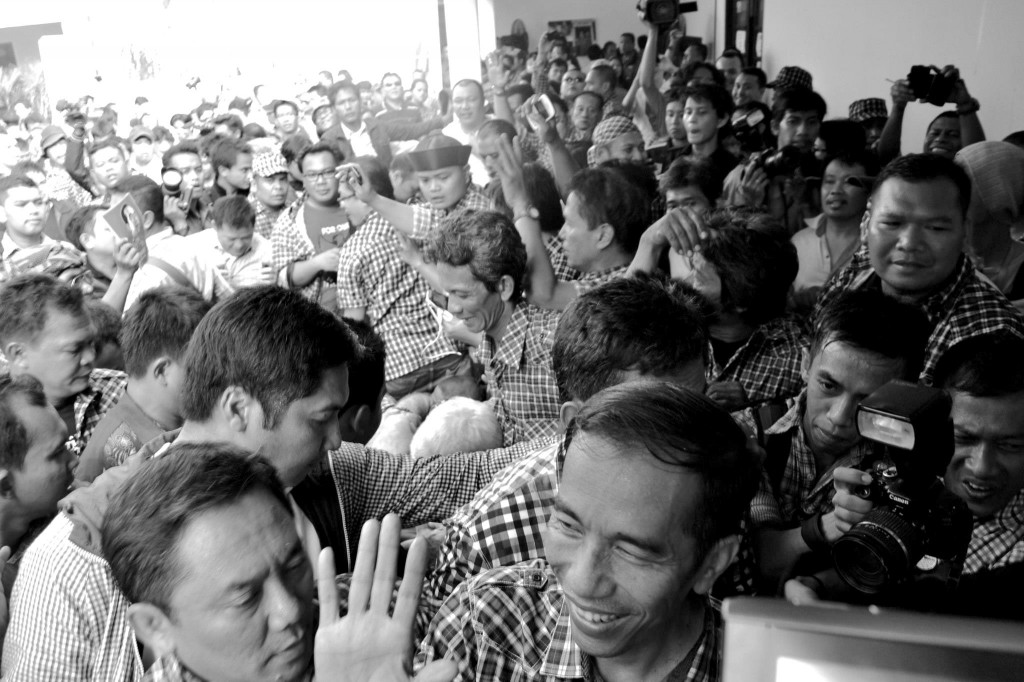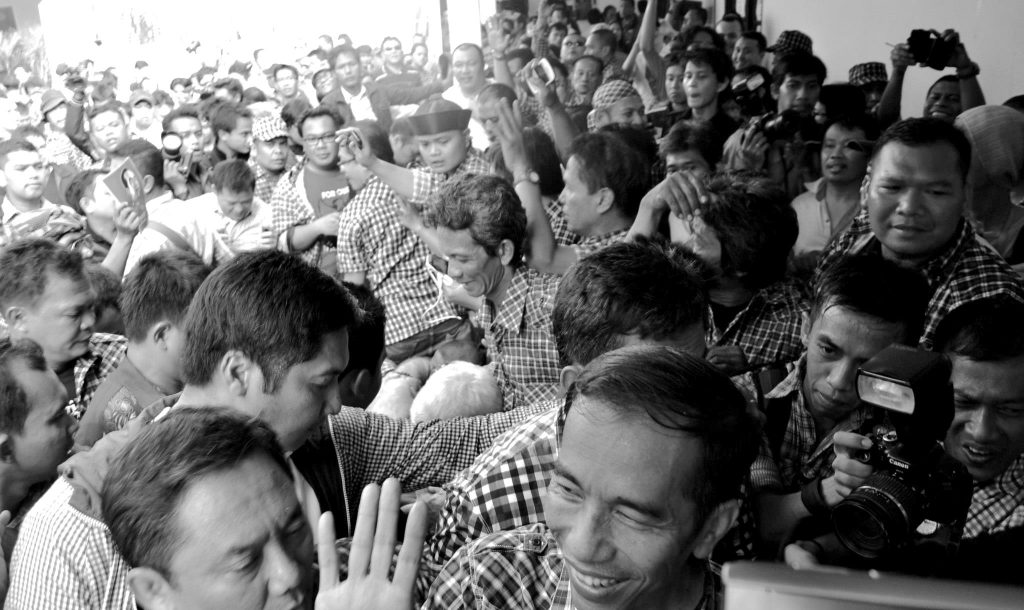
Joko Widodo (foreground, centre) is mobbed by supporters after winning the 2012 Jakarta gubernatorial election. Author photo.
The announcement that Joko Widodo had been given his party’s presidential candidacy was cathartic and oddly anticlimactic. More than a year of speculation about whether PDI-P party matriarch, former President Megawati Soekarnoputri, would give the wildly popular Governor of Jakarta a shot at the presidency came to an end with a hastily convened media conference in a poor neighbourhood of the capital. There, Jokowi (as he is universally known) made what must be the most succinct declaration of a presidential candidacy in the history of democracy. He said, “I have gotten the mandate from PDI-Perjuangan Chairwoman Mrs Megawati Soekarnoputri to be the candidate for the President of the Republic for Indonesia from PDI-Perjuangan. In the name of God, most gracious and most merciful, I am ready to do it”, before kissing the Indonesian flag placed conveniently behind him.
Not exactly stirring. Then again, this skinny, self-effacing populist has never been known for his oratory. He lets his actions–impromptu visits to lower-class neighbourhoods and tours of public works projects, wearing cheap clothes and doing more listening than talking–speak for themselves. They say: I understand you, I understand your problems, and I’m going to find a way to help you. Getting to the essence of why the punters like the 52-year old governor so much is easy–as Dave McRae pithily put it, for the first time ‘Indonesians look at a politician and they see themselves in him’.
Trying to get to the essence of what Joko Widodo’s presidential candidacy means for the future of Indonesian democracy, however, is less straightforward. Thanks to his reluctance to talk in depth about national policy issues, let alone foreign affairs, the man and his worldview are enigmatic. His political career contains enough contradictions to provide–for those with an analytical axe to grind–evidence of his either being a reformist Messiah or a client of the ruling oligarchy. As with so many things in Indonesia, objectivity means embracing the paradoxes.
The good news is that there are many reasons to see Jokowi as a real break with the past. Roughly a decade younger than the rest of the likely presidential candidates and with a home base in the small city of Surakarta, he has no longstanding links with the Jakarta establishment. One of the most obvious flaws of Indonesia’s democracy, of course, is just how much of the political elite is made up of people who ascended to the top of the heap during the Soeharto era and have managed to stay there since. Look at the candidates for the first two direct presidential elections, in 2004 and 2009: almost every candidate for President or Vice-President was a paid-up member of the former New Order ruling class. The inability of democratisation to dislodge these corrupt mediocrities from power showed that the ability to fund extensive patronage networks was all that mattered to the process of gaining and keeping political power, said sceptics of Indonesian democratisation.
By contrast, in a country where party nominations are routinely bought and sold, Jokowi was headhunted by the party bosses Megawati and Prabowo Subianto to run in for governor in Jakarta and has again forced the hand of Megawati to give him the presidential candidacy through the sheer force of popularity. One of his campaign managers in 2012 told me amusedly that ‘this is the first time in Indonesia when a candidate hasn’t paid a mahar (dowry) to get nominated’.
One of the concern of sceptics has been his this sponsorship from such pillars of Indonesia’s establishment as Megawati and Prabowo. This is definitely a complex matter and something to discuss in a future post: the answer to the question of just how beholden he is to Megawati in particular is one which will have significant implications for his presidency. The argument that he is now merely a puppet of theirs, however, is ridiculous. The popularity of the ‘puppet’ has killed the alleged puppet masters’ chances to win the presidency in 2014. Some conspiracy.
A more general complaint of Jokowi sceptics is that he represents a type of celebrity politics, the endurance of a personalistic (even patrimonial) political culture in which people look to a messianic figure to solve their problems. But this isn’t surprising: he is, after all, a populist. As with all populist politicians, his relationship with the electorate is ‘top-down’ and personalistic, rather than rooted in and mediated by a well-institutionalised and internally democratic political organisation. No such movement exists in Indonesia, and Jokowi certainly can’t be held responsible for that. As distasteful as some may find his charismatic politicking, any realist has to admit that there’s a pipe-dream quality to ideas like a coalition of civil society groups holding a convention to nominate a presidential candidate, and that it will be a long time before the Indonesian left is in anything like a state to organise into a coherent social democratic party. An inclusive and vaguely reformist populism, as exemplified by Jokowi, is as good as it was realistically going to get for Indonesia in 2014. His presence in the race ought to be welcomed as the shot in the arm that the country’s democracy needed at this moment.
As far as those for whom commenting on politics is a vocation are concerned, there is little intellectual prestige in optimism. For some reason, being accused of cynicism never stings as much as being accused of naiveté, and this makes pessimism the safer option. Nevertheless, I’ll throw caution into the wind and say that Joko Widodo’s candidacy–and almost guaranteed presidency–are a very welcome watershed moment in Indonesian politics. He has raised the bar for Indonesian politicians, giving an electorate sick and tired of government that simply doesn’t do its job an opportunity to vote for a man whose only discernible ideology is trying to make sure that it does.
……….
Liam Gammon is a PhD candidate at the Department of Political and Social Change at the Australian National University. He wrote an honours thesis on Joko Widodo’s 2012 gubernatorial campaign and is currently researching populism in contemporary Indonesia.
 Facebook
Facebook  Twitter
Twitter  Soundcloud
Soundcloud  Youtube
Youtube  Rss
Rss 